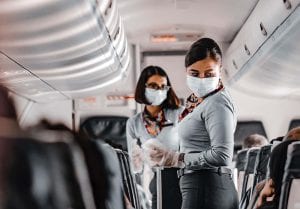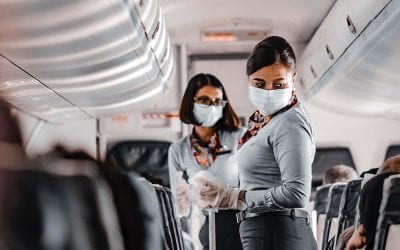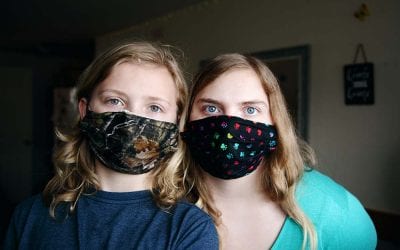A summer COVID wave is hitting the U.S. and many other nations across the globe, and travelers should take COVID seriously.
 Since June, the number of cases of COVID-19 has been rising rapidly in the U.S. and worldwide. Take preventative actions, such as getting vaccinated and wearing face masks.
Since June, the number of cases of COVID-19 has been rising rapidly in the U.S. and worldwide. Take preventative actions, such as getting vaccinated and wearing face masks.
The CDC’s (U.S. Centers for Disease Control and Prevention) measure of U.S. COVID viral activity in wastewater rose to 8.82 earlier this month. While it dropped to 8.68 last week, it’s still high. The viral activity in May was only 1.36. Testing COVID viral activity in wastewater is a proven predictor of COVID-19 infections in the general population.
In the U.S., weekly COVID hospitalizations are currently at a significant 4.4 per 100,000 population. Weekly COVID deaths in the U.S. are estimated to be more than 600 at this time.
With significant summer COVID-19 infections, travelers need to take it seriously by taking preventative measures.
There is no doubt that travelers need to take COVID seriously during this summer wave of the disease. While COVID infections are well below the infection rate at the recent pandemic’s height, COVID is still a serious disease, killing far too many each week. Contracting COVID when traveling internationally can be particularly serious as obtaining prompt medical attention and treatment outside one’s home nation can be difficult. In many nations, well-known treatment drugs easily obtained in the U.S., like Paxlovid and Molnupiravir, are either unavailable or frightfully expensive.
At least for the remaining summer and early fall, then likely again in the upcoming winter months, travelers need to take COVID precautions to avoid contracting the illness, particularly if they are among the most vulnerable people.
Travelers who are particularly vulnerable to COVID cases are senior citizens, cancer patients, and the immunosuppressed.

As a senior citizen, I had a rough COVID case during the pandemic. I was able to get treatment started within an hour of testing positive for the virus. I had severe chills and a fever that reached 103.4°F for a short time. COVID added a sore throat, a cough, lung congestion, and shortness of breath. I lost my sense of taste and smell. I was fatigued, had body aches and severe migraines.
When I contracted COVID during the pandemic, while Paxlovid helped me quickly recover, it’s clear that because I was fully vaccinated I escaped contracting a serious case of COVID.
For 36 hours I was a mess, but fortunately I quickly responded to Paxlovid. I am thankful that I had the good sense to be fully vaccinated for COVID or I would likely have had to be hospitalized, perhaps put into intensive care.
Travelers need to take preventative steps to mitigate the chance that they will get infected with COVID. Travelers who contract even a mild case of COVID will at least be delayed in continuing their business trip or vacation for a number of days while they’re ill, even with treatment and while they’re contagious. Getting COVID while traveling could kill a business deal or ruin a vacation.
Bring COVID tests with you when you travel. If you have symptoms, you can quickly determine if you have COVID-19. Take all steps to treat the virus and prevent infecting others.
COVID test kits:
While it isn’t a preventative per se, to get treated quickly if travelers contract COVID, they need to be able to test for the virus as soon as they have symptoms. By being able to quickly test for COVID, travelers will know that they need to not only immediately treat for the disease but stay isolated for a time so they don’t infect others, particularly high-risk individuals.
I recommend taking at least four COVID test kits for each traveler while away from home for more than a weekend. Ensure that the test kits are still valid long before you start on your journey so that you have time to purchase valid ones in case your kits have already expired.
COVID vaccinations are scientifically proven to prevent serious COVID cases to prevent hospitalizations.
Vaccinations:
Scientific studies have proven the substantial benefit of COVID-19 vaccinations. Although they won’t totally prevent contracting the disease, it’s fully documented that COVID-19 vaccinations have saved millions of lives.
The U.S. Food and Drug Administration (FDA) has approved the new mRNA COVID vaccines. The new vaccines should be in local U.S. pharmacies and doctors’ offices by late this week. Public health officials are encouraging annual vaccinations against COVID. According to the CDC, everyone 6 months of age and older should receive an inoculation of the new COVID vaccine. Vaccination is an extremely effective way to reduce the severity of a COVID-19 infection for those who contract the virus. It also offers immunity for a limited period after receiving the shot.
The new COVID vaccines are important to use because they target the KP.2 variant. The variant and closely related strains are the cause of most of the recent COVID infections. At this point, COVID, while still a killer, is less dangerous than earlier strains because our bodies have become used to fighting COVID off and because so many have been vaccinated and/or infected and therefore have at least some immunity to COVID. The new vaccine can substantially improve the strength of existing COVID defenses.
I’ve studied the science behind the vaccines and have spoken with public health officials and scientists. I’m fully vaccinated to date and will be getting the new COVID mRNA vaccine by the end of September.
Wearing N95 or KN95 face masks is a scientifically proven method of preventing COVID transmission via respiratory aerosols.
Masking:
There is another method that travelers can use to protect themselves from COVID-19. Unfortunately, during the COVID-19 pandemic, it became controversial, but it shouldn’t have been. N95 and KN95 face masks, when properly worn over the nose and mouth, can prevent COVID-19 transmission.
In tight inside locations, a properly worn N95 or KN95 face mask can protect you from those around you who have COVID. Adequate protection from respiratory viruses like COVID by wearing a mask is not conjecture. Study after study have proved that N95 and KN95 face masks are highly effective at preventing the transmission of COVID.

READ ALSO:
Changes to AA AURA tool to reassign connecting flights are long overdue
7 mistakes to avoid at TSA airport security checkpoints
After many years working in corporate America as a chemical engineer, executive and eventually CFO of a multinational manufacturer, Ned founded a tech consulting company and later restarted NSL Photography, his photography business. Before entering the corporate world, Ned worked as a Public Health Engineer for the Philadelphia Department of Public Health. As a well known corporate, travel and wildlife photographer, Ned travels the world writing about travel and photography, as well as running photography workshops, seminars and photowalks. Visit Ned’s Photography Blog and Galleries.


